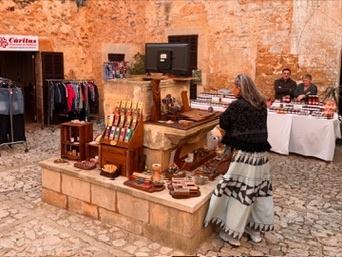How do local saints’ celebrations in Mallorca offer travelers a unique perspective on Catalan linguistic identity?
Similar Topics
local saints celebrations
mallorca catalan identity
mallorquí language
catalan linguistic heritage
traditional mallorcan festivals
religious processions mallorca
catalan cultural traditions
mallorcan folk music
Local saints’ celebrations in Mallorca provide travelers with a rich and immersive glimpse into the island’s Catalan linguistic identity, which is deeply rooted in its history and cultural traditions. These festivals, often featuring religious processions, folk music, and communal meals, are conducted primarily in Mallorquí, the local variant of Catalan spoken on the island. Observing or participating in these events allows visitors to hear the language in its most authentic context, moving beyond the more standardized Catalan taught in schools or found in official signage. The use of Mallorquí in prayers, speeches, and songs at these celebrations highlights the linguistic nuances and regional pride that are central to Mallorcan identity.
Moreover, these festivities showcase how language serves as a living, vibrant element of daily life rather than just a static symbol. Through traditional dances like the ball de bot and the recitation of prayers or blessings in Mallorquí, travelers witness firsthand the inseparable connection between language, faith, and community. The gatherings foster a sense of belonging among locals and underscore the resilience of Catalan linguistic heritage amidst broader Spanish influence. By engaging with locals in these settings, visitors often experience the warm hospitality of Mallorcans who are eager to share stories and explain the significance of their linguistic and cultural customs.
In addition to offering linguistic insight, saints’ celebrations open a window into how Mallorca maintains its distinctive Catalan identity through festive rituals. The interplay of religious devotion and cultural expression during these events illustrates the ways language is preserved and celebrated within a communal framework. This interplay makes the experience especially meaningful for travelers, as it reveals the island’s commitment to keeping its linguistic heritage alive through collective memory and ritual practice. Experiencing these celebrations can deepen an understanding of Mallorca’s unique place within the broader Catalan-speaking world, enriching any visitor’s appreciation of the island beyond its scenic beauty and tourist attractions.
Moreover, these festivities showcase how language serves as a living, vibrant element of daily life rather than just a static symbol. Through traditional dances like the ball de bot and the recitation of prayers or blessings in Mallorquí, travelers witness firsthand the inseparable connection between language, faith, and community. The gatherings foster a sense of belonging among locals and underscore the resilience of Catalan linguistic heritage amidst broader Spanish influence. By engaging with locals in these settings, visitors often experience the warm hospitality of Mallorcans who are eager to share stories and explain the significance of their linguistic and cultural customs.
In addition to offering linguistic insight, saints’ celebrations open a window into how Mallorca maintains its distinctive Catalan identity through festive rituals. The interplay of religious devotion and cultural expression during these events illustrates the ways language is preserved and celebrated within a communal framework. This interplay makes the experience especially meaningful for travelers, as it reveals the island’s commitment to keeping its linguistic heritage alive through collective memory and ritual practice. Experiencing these celebrations can deepen an understanding of Mallorca’s unique place within the broader Catalan-speaking world, enriching any visitor’s appreciation of the island beyond its scenic beauty and tourist attractions.
🧩 Related Questions
Related Question
In what ways does almond cultivation provide employment opportunities for local communities in Mallorca?
Related Question
What local resources or apps provide real-time updates on water conditions around Mallorca?
Related Question
What role does the Agriculture and Fisheries Department play in supporting sustainable farming practices on the island?
